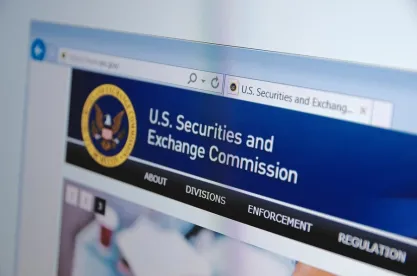On April 2, 2021, the US Securities and Exchange Commission (SEC) approved, effective immediately, permanent rules changes proposed by the New York Stock Exchange (NYSE) to the NYSE’s shareholder approval rules for certain security issuances to related parties and those above the 20% threshold, and clarified the definition of and procedure for audit committee approval of related party transactions.
The rule changes to the shareholder approval requirements are substantially the same as the temporary waivers granted by the SEC through the end of 2020 (which we previously reported on here and here). These shareholder approval changes better align the NYSE’s shareholder approval rules with those of the Nasdaq and the NYSE American markets. However, the clarifications to the related party transactions approval process were new and are likely to impact the audit committee’s process for approval of related party transactions.
Below is a brief summary of the permanent rule changes to the NYSE shareholder approval requirements and the related party transactions rule.
Clarification of Definition of Related Party Transactions and Process for Audit Committee Review
NYSE Rule 314.00 requires NYSE-listed companies’ audit committees (or comparable bodies performing a similar function) to review “related party transactions,” a term that, until now, was not defined by the NYSE. The prevailing practice by most listed companies and practitioners was to apply this NYSE requirement consistently with the Item 404 of Regulation S-K disclosure requirement (which requires disclosure of related party transactions where the related party has a material interest and the amount involved in such transaction exceeds $120,000).
Rule 314.00 now expressly defines “related party transactions” as transactions required to be disclosed pursuant to Item 404 of Regulation S-K without applying the $120,000 transaction value threshold. Additionally, the changes expressly require the prior review of such transactions by an NYSE-listed company’s audit committee (or independent body of the board) for potential conflicts of interest and to prohibit such transactions if inconsistent with the interests of the company and its shareholders.
These changes likely will expand the breadth of transactions reviewed by the audit committee (or other comparable body) since Rule 314.00 now expressly includes related party transactions that fall under the $120,000 transaction value threshold found in Item 404 of Regulation S-K and may change the timing of certain reviews since the audit committee may not have always provided prior approval of the related party transaction. These changes may require companies to update their audit committee charters and internal policies and procedures to include the prior review of all related party transactions, regardless of the size of such transactions.
Changes to Shareholder Approval Requirements — Related Party Rule and 20% Rule
Related Party Rule
Prior to the changes, Rule 312.03(b), or the “related party rule,” required shareholder approval prior to issuances of common stock, or securities convertible to or exercisable for common stock, to the following parties if the issuance of the securities exceeded 1% of the number of shares of common stock or voting power outstanding prior to such issuance: (1) directors, officers, or substantial security holders of the listed company (each, a related party); (2) a subsidiary, affiliate, or other closely related person of a related party; or (3) any company or entity in which a related party has a substantial direct or indirect interest. The NYSE rules previously provided a limited exception to the related party approval rule that permitted cash sales to a substantial security holder (classified as a related party solely due to its status as a substantial security holder) of no more than 5% of the outstanding stock at a price that met certain minimum price requirements.
Following the changes to the “related party rule,” NYSE-listed companies:
-
No longer need shareholder approval prior to issuances of securities to a related party’s subsidiaries, affiliates, or other closely related persons or to any companies or entities in which a related party has a substantial direct or indirect interest (unless the related party has a 5% or greater interest in the listed company or the assets are being acquired with the proceeds of the issuance).
-
Will need shareholder approval prior to cash sales to related parties only if the price is less than the current market price (assuming no other shareholder approval rules apply).
-
Will need shareholder approval prior to any issuance or series of related issuances in which a related party has a 5% or greater interest (or all related parties involved in such transactions collectively have a 10% or greater interest), when such issuance(s) would result in a 5% increase in either the number of shares of common stock or voting power outstanding before the issuances(s).
Issuances to related parties of greater than 1% of the number of shares of common stock or voting power outstanding will continue to require shareholder approval when such issuance involves a noncash sale or is at a price less than the current market price.
20% Rule
Rule 312.03(c), or the “20% rule,” previously required NYSE-listed companies to obtain shareholder approval prior to any nonpublic issuance that exceeded 20% of the number of shares of common stock or voting power outstanding. NYSE rules provide a limited exception to the 20% rule for cash sales meeting certain minimum price requirements in a “bona fide private financing.” The term “bona fide private financing” is defined as a sale in which either (i) a registered broker-dealer purchased the securities from the NYSE-listed company with the goal to sell such securities to one or more purchasers in private sales; or (ii) the NYSE-listed company sells securities to multiple purchasers, and no single purchaser or group of related purchasers acquires or has the right to acquire, upon exercise (or conversion) of the securities, greater than 5% of the NYSE-listed company’s common stock or voting power.
The changes to the 20% rule have eliminated the 5% cap in the bona fide private financing exception for any issuance that does not involve a change of control. Additionally, the references to bona fide private financing in the NYSE rules have been replaced with the following phrase: “other financing (that is not a public offering for cash) in which the company is selling securities for cash.” However, note that shareholder approval still will be required for issuances of shares for cash in nonpublic transactions in connection with an acquisition when the shares issued in connection with the acquisition exceed 20% of the number of shares of common stock or voting power outstanding before such issuance.
Note that there were no changes to the requirement under NYSE Rule 312.03 for shareholder approval, with certain exceptions, prior to security issuances in connection with the following:
-
Equity compensation plans (Rules 312.03(a) and 303A.08, or the “equity compensation rule”)
-
A resulting change of control of the issuer (Rule 312.03(d), or the “change of control rule”)
Deletion of Rule 312.03T
Temporary Rule 312.03T was adopted when the NYSE waived certain shareholder approval requirements through the end of 2020. However, because Temporary Rule 312.03T expired on its terms on June 30, 2020, the SEC has approved the deletion of the temporary rule in its entirety.





 />i
/>i

